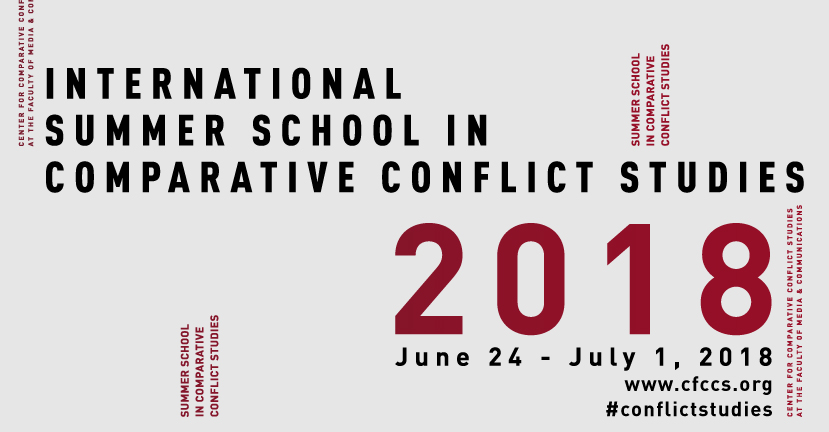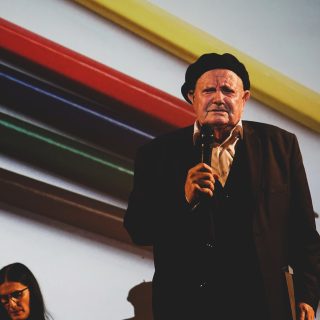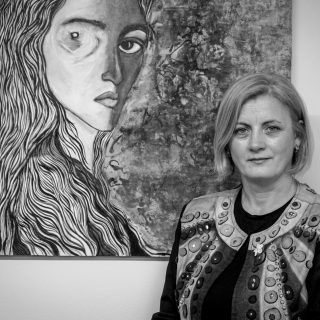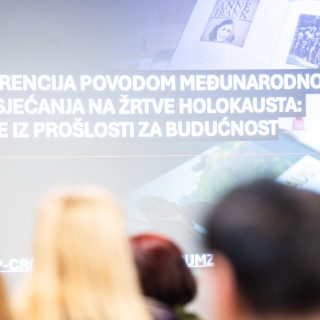2018 INTERNATIONAL SUMMER SCHOOL IN COMPARATIVE CONFLICT STUDIES
June 24 to July 1, 2018
Center for Comparative Conflict Studies (CFCCS) at the Faculty of Media and Communications (FMK),
Singidunum University, Belgrade
The Center for Comparative Conflict Studies (CFCCS) at the Faculty of Media and Communications (FMK), Singidunum University invites you to apply for the 9th International Summer School in Comparative Conflict Studies. The 2018 Summer School will take place at the Faculty of Media and Communications in Belgrade, from June 24 to July 1, 2018.
The Summer School in Comparative Conflict Studies is part of the Politics department at FMK and the MA program in Critical Political Studies. It provides a learning opportunity for students interested in the study and analysis of societies in and post-conflict. Interdisciplinary in its nature, drawing from the fields of Peace and Conflict Studies, History, Anthropology, Education, Law, Political Sciences and International Relations, the Summer School in Comparative Conflict Studies provides students with an interactive learning experience utilizing frontal lectures and class discussions focusing on comparative conflict analysis of different case studies.
DEADLINE TO SUBMIT APPLICATIONS: MARCH 30, 2018
Language of instruction for all courses is English
Students who complete the course requirements may transfer the course credit to their home institution (5 ECTS).
(Applicants can attend only one course from this list)
Citizenship and Violence: From States to Streets
Course Description
Why violence, visible and non-visible, physical and structural, cannot be separated from citizenship, ancient and modern? Why being political cannot avoid violence, even when we present ourselves or want to be non-violent? What defines citizenship then? The idea of membership, common identity and participation only? Or exclusion, conflicts, wars, violence and our perception and construction of enemies might have a strong influence on how we perceive ourselves as citizens as well? What happens when we cannot agree about the nature and institutions of our political community? What happens when we descend on the streets and confront ‘legal’ owners of violence?
The study of citizenship, as theory, institution and practice, is necessary to understand how political communities are made, un-made and re-made. Modern citizenship seems to be a tool that can be used for different and opposing goals, from integration and re-unification to fragmentation and ethnic engineering. This implies that it is also a tool of exclusion in defining borders of political communities. This rarely happens without Violence.
The course will be dedicated to general theories of citizenship, contemporary debates on citizenship, as well as to various practices of citizenship in Southeast Europe. We will discuss citizenship in the post-1989 Europe, in the West and in the former socialist East with a special focus on the post-socialist Balkans. After examining legal and political uses and misuses of citizenship related to status and rights of individuals, we will further distinguish between active and activist citizenship as well as present new social movements in this region.
Our focus on the Balkans offers us a an inspiring angle to narrate an alternative political history of this region, but also an insight into the fine mechanics and repeating glitches of modern politics, applicable to multinational states in the European Union and beyond.
Rethinking Peace Education: The Work of Identity and Culture in Conflict Ridden Societies
Course Description
The course offers a critique of Western positivist paradigmatic perspectives that currently guide peace education, maintaining that one of the primary weaknesses of current bilingual and multicultural approaches to peace education is their failure to account for the primacy of the political framework of the nation state and the psychologized educational perspectives that guide their educational work. It does so by revealing the complex practices implemented, in educational contexts in areas of enduring conflict, while negotiating identity and culture.
The course presents critical theorizations and conceptualizations of identity, culture, conflict, and other foundational concepts derived from a long-term ethnographic study of the integrated bilingual Palestinian-Jewish schools in Israel. These schools’ main goal is to offer a new egalitarian, bilingual, multicultural educational option to facilitate the growth of youth who can acknowledge and respect "others" while maintaining loyalty to their respective identitarian and cultural traditions.
Change, it will be argued, will only occur after the Western positivist paradigmatic perspectives that currently guide peace education are abandoned, a step which entails critically reviewing present understandings of the individual, of identity and culture, and of the learning process.
In order to do this, we will first learn about the paradigms and conceptual frameworks which guide our understanding of conflict and multicultural/peace education as they develop in different conflictual, political and geographical contexts and identify a variety of approaches related to various dimensions of peace education. The course will familiarize participants with the complexities of the Israeli Palestinian conflict, with an emphasis on the present situation within its internationally recognized borders. The course will then critically examine sociological, psychological, and anthropological approaches to identity and culture and discuss matters relating to the place of culture and identity in the world of education in general and peace education in particular. Lastly, we will apply the concepts and theories learned to the analysis of data gathered in educational contexts confronting intractable conflicts such as the cases of Israel and Cyprus.
Migrants, Borders, Power(s): Contemporary Struggles, Moral Claims and Regimes of (im)mobility
Course description
Theoretical and ideological images of a borderless and interconnected global condition in which the nation state’s power decreases and “flows” of people, capital and information mark they day, have been continuously challenged since the 1990s. Apart from the financial and austerity “crises”, it is precisely the rise and violence of borders, of restrictive and neoliberal migration regimes and of right-wing populist (xenophobic, racist and islamophobic) calls for securing the “nation” (in Europe and beyond), which have shown the power of (particular) states in the midst of trans-state institutions and unfolding neoliberal globalization.
Being able to move and cross boundaries, but also being able to afford to actually live in particular places have become increasingly important dimensions of the contemporary struggles for securing a “good life”. Mobility (including phases of “being stuck”) can – at different times, in different places and for different people – figure a resource, a right as well as a means of exploitation and marginalization. It is precisely the so-called “migration/refugee crisis” which has most recently revived older and ongoing debates on (failed) multiculturalism and “integration” (with regards to “Islam” in particular) as well as conflicts and moral claims over “deservingness” and the (re)distribution of wealth and social rights.
This course will comparatively explore different theoretical approaches as well as different cases and configurations of migration and borders (in Europe and beyond). The comparative orientation of the course will enable the participants to compare both theories and cases as well as different social actor’s perspectives (EU, states, civil society, migrants, refugees, local population, men, women, different generations etc.) within particular cases. This comparative approach will enable in-depth critical discussions on heightened contemporary debates on: Who is “just” a migrant and who is a refugee? Who “deserves” to stay, gain citizenship and obtain which social rights? Who can cross which borders? What is a “good life” for whom? What are the migration-related powers and responsibilities of particular states and trans-state instances (e.g. EU)? What is multiculturalism/diversity/integration? What are the impacts of particular migration and integration regimes? etc.
The course will be comprised of input-lectures and close readings of classic and contemporary texts from the interdisciplinary fields of (forced)migration/mobility studies and border studies with a special focus on ethnographic approaches. Furthermore the course will offer a setting for presenting and discussing ongoing and envisioned participants’ research projects (theoretical and/or empirical) on relevant themes. Finally the course will include discussing contemporary films as well as a knowledge exchange with guest speakers from the local social science and civil society sector on migration/border issues in the context of Serbia/Belgrade.
Religion and Conflict: The Balkans’ Explorations vs. Explorations of the Balkans
Course Description and Objectives
This course will explore the processes of how political and ethnic conflict can become “religious”, on the one hand, and how religion can itself generate conflict, on the other. During the course, students will learn about the nature of conflict in general and specifically about religious conflict. The course inquires into various interactions between religious and ethno-national identity, with special attention paid to inter-relations among different religions in the Balkans. The relationship between religion and ethnicity, politicized aspects of religious conflicts, and the place of religion in relation to questions of nationalism and hegemony will also be explored during the course.
It will begin with an examination of the complexities of conflict and related academic theories of conflict and religion, as well as the nature of the violence which often follows conflict. Students will gain an understanding of the role of religious communities (Jewish and Islamic) and churches (Catholic and Orthodox) in Balkans at the end of 20th and beginning of 21st century, as well as during the war in Bosnia and Herzegovina (1991-1995).
In addition, students will be able to “unpack” different religious interpretations of sacred texts, understanding how these texts can be the foundation for either violence or peace.
Finally, the course will offer some solutions – how religion and its spirituality, theologies, and methodologies can be used in the process of conflict transformation and peace-building. This will be observed from Jewish, Christian and Muslim perspectives.
From Intervention to Non-Intervention: The Triumph of State Sovereignty over Human Rights?
Course Description
The fundamental organising principle in the international system has long been one of state sovereignty, whereby states are considered to have authority over a defined and internationally recognised territory, protected from external intervening forces. Thus, inextricably linked to sovereignty has been the further principle of non-intervention. In 1991, George Bush Senior spoke of a ‘New World Order’, one in which the United Nations would now be free to fulfil its founders’ visions. As a result, for much of the post-Cold War period, the principle of non-intervention was challenged by successive interventions into the sovereign affairs of states by international organisations, notably the United Nations and NATO, as well as some states. As if in acceptance of this new world order in which human rights protection could – would – be privileged over traditional understandings of sovereignty, in 2005 the international “community” adopted the principle of the Responsibility to Protect (R2P). R2P has since been widely debated by reason of the emphasis it places on achieving justice for people, placing obligations on states to protect the wellbeing of their citizens and to face the possibility of an outside intervention when they fail to do so. However, following the so-called Arab Spring, successive states in North Africa and the Middle East have experienced instability and/or intrastate conflict, leading to enormous loss of life, injury and displacement of people. After a speedy intervention in Libya in 2011, western states particularly have apparently lost all appetite for interve
tion, as the Syrian people have discovered since the start of the intrastate conflict that has engulfed their own state.
In November 2015, the UN’s Under-Secretary-General for Humanitarian Affairs spoke of this war “that has cost an estimated 250,000 people their lives, given rise to extremist and terrorist groups, and reduced much of the country, a middle-income country, to rubble”. He estimated that 13.5 million Syrian people were now in need of humanitarian assistance, while more than 4 million had become refugees. Despite these figures, it was not until Syria’s conflict was brought to the streets of France through the Paris attacks in November 2015 that European states began to reconsider their non-interventionist stance. Thus, just 10 years after R2P, circumstances are suggestive of a limited and certainly wavering commitment to the principle of rights protection and therefore to the vision of a New World Order.
In this course, students will be introduced to the underpinning concepts and competing understandings of (non-)intervention in situations of conflict, state collapse, humanitarian and human rights emergencies. Students will learn to identify and deliver a critical analysis of those factors that shape crisis, international intervention and non-intervention. Emphasis is then placed on the application of concepts and theories to real-life scenarios, examining a few of the case studies that have been particularly significant in respect of developing international-level responses to crises. Ultimately, students will be required to deliver well-evidenced verdicts on whether human rights have been relegated to the second tier of principles to be defended by the United Nations and its signatories.
Course themes
Throughout the course, students will be asked to consider the causes and effects of events and actions in relation to conflict and crisis in the international arena. Four core themes in the study of Intervention will sit at the heart of our studies: Sovereignty, Legitimacy, Legality, Human Rights. The course aims to help students understand the arguments for and against intervention: what motivates actors to intervene, what constrains them, the inherent costs and dangers of their choices. Through study of a number of interventions, students will debate the choices available to actors in order to achieve an understanding of the context in which difficult decisions are made and the consequences of those decisions. Finally, they will have to consider whether and how those decisions shape the wider international order.
Memory and Conflict: Remembering and Forgetting in Divided Societies
Course Description
This course invites students to explore the study of conflict analysis and conflict transformation through a journey in the field of social memory studies. The course will focus on the role of memory politics in peace and conflict studies. By doing so, the course will allow students to delve into the analysis of internal dynamics of societies in or after conflict and discuss the ways in which they negotiate their pasts, presents and futures in the aftermath of war, conflict, repression, dictatorship, genocide and mass atrocities.
The course will explore dynamics and frameworks enabling the social organization of memory, and modes in which entire communities (and not only individuals) preserve remember and forget the past, commemorate it, deny or obliterate it. Finally, the course will highlight practices related to memory work and memory activism in spaces of mnemonic conflicts over the narratives and representations of the past.
In order to do so, students will be introduced to some underpinning concepts in social memory studies and in conflict studies. Students will then apply this theoretical knowledge to a number of case studies, allowing them to further investigate the role of memory and memory activism in conflict analysis, and think comparatively about processes in conflict and post-conflict transformation.
Course Structure
- Theoretical introduction to memory politics, conflict analysis and Conflict Transformation;
- Collective Memory and National Calendars: collective memory, community memory, social organization of national memory, commemorative events, memory laws;
- Memory work and memory activism in and after conflict.
Case studies may include
- Revisiting 1948: Mnemonic Socializations & Memory Activism among Israelis & Palestinians;
- Remembering the Wars of the 1990s? From Anti-War Activism to Memory Activism in Serbia;
Our courses are offered to graduate students, advanced undergraduate students and professionals working in related fields.
All courses are in English.
For all questions and information please contact us at summerschool@cfccs.org
Source: CFCCS




